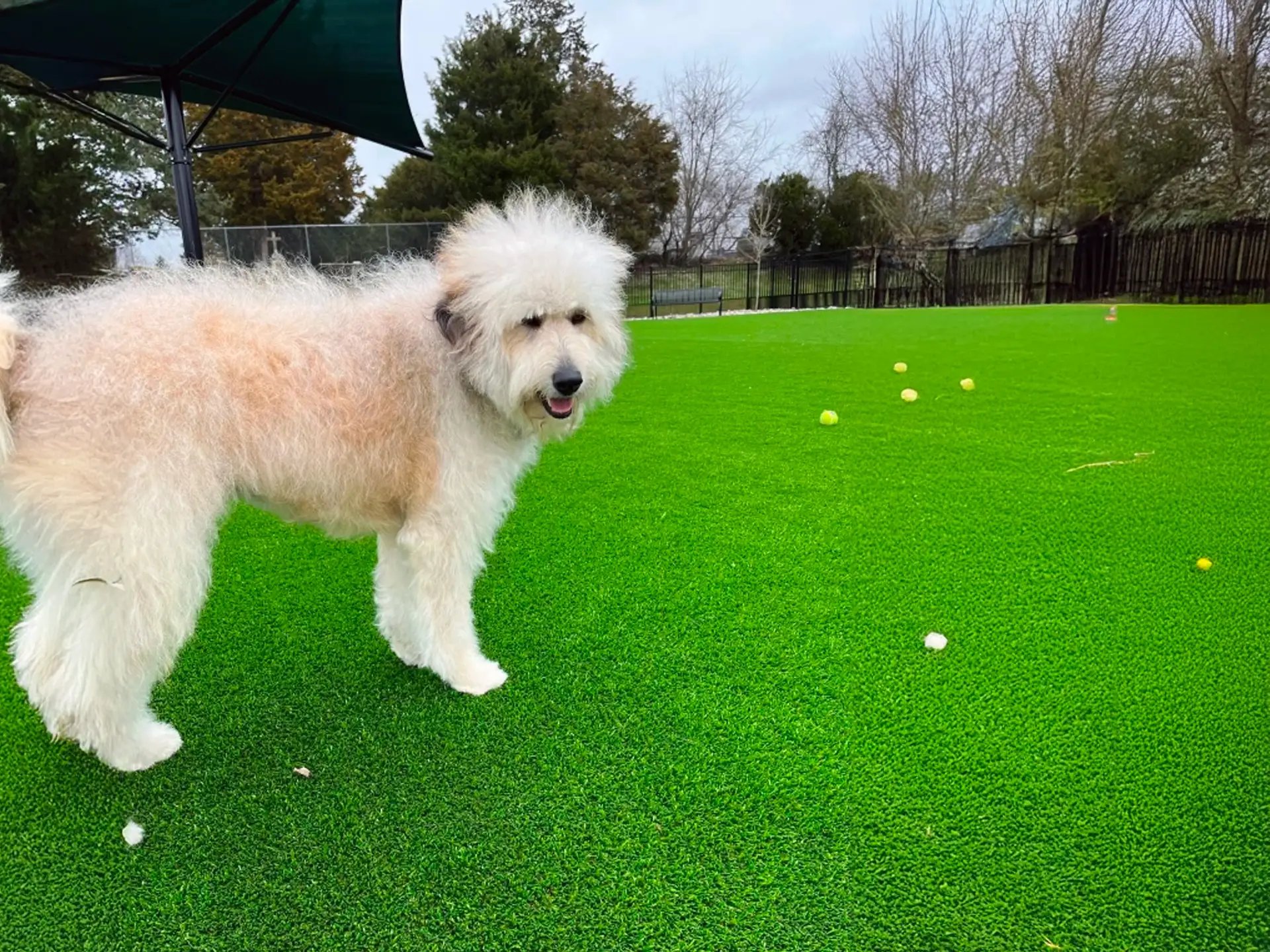Border Doodle Dog Breed Info & Overview
The Border Doodle, a charming mix of the Border Collie and Poodle, is known for its intelligence, friendly nature, and low-shedding coat. This breed combines the energy of the Border Collie with the elegance of the Poodle, making it a great companion for families and active individuals. With their playful spirit and trainability, Border Doodles bring joy and versatility to any home.
Characteristics
Pictures
Breed History
The Border Doodle is a relatively new hybrid, combining the best traits of the Border Collie and the Poodle. This mix first gained popularity in the late 1990s in the United States, as breeders aimed to create a dog with the intelligence and agility of the Border Collie, paired with the low-shedding coat of the Poodle.
The Border Collie, renowned for its herding prowess in the hills of Scotland and England, brings unmatched intelligence and work ethic to the mix. The Poodle, originally bred in Germany as a water retriever, contributes hypoallergenic qualities and keen smarts. Together, they form a versatile companion suited for various roles.
Though not recognized as an official breed by major kennel clubs, the Border Doodle has steadily grown in popularity among dog enthusiasts seeking a clever, trainable, and family-friendly pet. Their unique blend of attributes from both parent breeds makes them stand out in the world of designer dogs.
Temperament, Personality
Border Doodles are renowned for their sharp minds and eager-to-please attitudes. They inherit the Border Collie’s intelligence and the Poodle’s friendly disposition, resulting in a dog that’s both quick to learn and affectionate. Their alertness makes them excellent watchdogs without being overly aggressive.
With proper socialization, they get along wonderfully with children and other pets. Their playful nature and gentle demeanor make them great playmates for kids, while their sociable side helps them integrate well with other animals in the household. They thrive on companionship and enjoy being part of family activities.
Strangers are usually met with a curious but cautious approach. Border Doodles may be reserved at first, but they often warm up quickly once they sense no threat. Their intelligence means they pick up on cues from their owners, so positive interactions with newcomers can help them become more outgoing.
Physical Characteristics
The Border Doodle typically sports a wavy to curly coat that can range from medium to long in length. Coat colors vary widely, including black, white, brown, and merle patterns. Their eyes are expressive, often reflecting their keen intelligence and alertness.
They have a well-proportioned, athletic build inherited from both parent breeds. Standing between 15 to 22 inches tall and weighing 30 to 60 pounds, they are considered medium-sized dogs. Their tails are usually fluffy and may curl slightly at the end.
One of the appealing features of the Border Doodle is their low to moderate shedding coat, thanks to their Poodle heritage. This makes them a potential option for individuals with mild allergies, although no dog is truly hypoallergenic.
Health Issues
While generally healthy, Border Doodles can inherit health issues common to their parent breeds. Hip dysplasia is one such concern, affecting joint mobility. Regular veterinary check-ups and maintaining a healthy weight can mitigate this risk.
They may also be prone to eye conditions like progressive retinal atrophy. Regular eye exams can help detect issues early on. Additionally, epilepsy and certain skin conditions may occur, so staying vigilant about any changes in behavior or appearance is important.
Choosing a reputable breeder who screens for genetic conditions can greatly reduce the likelihood of health problems. It’s also wise to familiarize yourself with the common health issues associated with both Border Collies and Poodles.
Grooming Needs
Border Doodles require moderate grooming to keep their coats in top condition. Regular brushing, at least two to three times a week, helps prevent matting and tangles, especially if they have a curlier coat. This also keeps their shedding under control.
Bathing should be done as needed, usually every few months, unless they get particularly dirty. Use a gentle dog shampoo to avoid skin irritation. Their ears should be checked regularly for signs of infection or wax buildup, given their floppy nature.
Don’t forget routine nail trimming and dental care. Brushing their teeth several times a week can prevent dental issues, and keeping nails trimmed ensures comfortable movement. Grooming sessions are also an excellent opportunity to bond with your Border Doodle.
Exercise Requirements
With high energy levels inherited from both parent breeds, Border Doodles need ample exercise to stay happy and healthy. Aim for at least 1 to 2 hours of physical activity per day. This can include walks, runs, or playtime in a securely fenced yard.
Mental stimulation is just as important. These intelligent dogs thrive on challenges like puzzle toys, agility training, and obedience exercises. Engaging their minds helps prevent boredom-related behaviors like chewing or digging.
Activities like fetch, frisbee, or even swimming can be great outlets for their energy. Joining a local dog sports club or enrolling in agility classes can also provide both physical and mental engagement for your Border Doodle.
Training Tips
Training a Border Doodle is generally a rewarding experience due to their intelligence and eagerness to please. They respond well to positive reinforcement techniques such as treats, praise, and play. Consistency is key to reinforcing desired behaviors.
Early socialization is crucial. Expose them to various environments, people, and other animals to build confidence and reduce the likelihood of fear-based reactions. Puppy training classes can be a great way to start this process.
Keep training sessions engaging and varied to hold their interest. Incorporate advanced obedience commands or tricks to challenge them mentally. Avoid harsh corrections, as these can lead to anxiety or stubbornness in such sensitive and intelligent dogs.
Nutrition, Diet
Feeding your Border Doodle a balanced diet is essential for their health and energy levels. High-quality dog food formulated for medium-sized, active breeds is recommended. Look for options rich in protein to support their muscle development and activity needs.
Portion sizes will vary based on age, weight, and activity level, but generally, they require about 2 to 3 cups of dry food per day, split into two meals. Monitoring their weight and adjusting portions accordingly helps prevent obesity.
Some Border Doodles may have sensitivities or allergies, so consult your veterinarian if you notice any digestive issues or skin irritations. Including omega-3 fatty acids in their diet can promote a healthy coat and skin.
Adoption, Breeders
If you’re interested in adding a Border Doodle to your family, consider both adoption and reputable breeders. Rescue organizations sometimes have this hybrid available. Communities and online groups like Reddit can help you locate adoptable dogs in your area.
When choosing a breeder, ensure they prioritize health and temperament. They should provide health clearances for both parent dogs, particularly for genetic conditions common in Border Collies and Poodles. Visiting the breeder and meeting the puppies’ parents can give you insight into your future pet’s potential traits.
Avoid puppy mills or pet stores where breeding practices are often substandard.
Family Pet?
Border Doodles make excellent family pets due to their friendly and affectionate nature. They bond closely with their human companions and enjoy participating in family activities. Their playful demeanor makes them great playmates for children.
They usually get along well with other pets when properly socialized. Their herding instincts might lead them to try and herd smaller animals or children, so supervision is recommended. Teaching them appropriate behaviors from a young age can mitigate this tendency.
Their low to moderate shedding coat is a bonus for households concerned about allergies. However, regular grooming is still necessary to keep their coat healthy and minimize allergens.
Right For You?
If you’re an active individual or family seeking a smart, trainable, and affectionate companion, the Border Doodle could be the perfect match. They thrive in environments where they receive plenty of mental and physical stimulation.
Potential owners should be prepared to invest time in exercise and training to meet this breed’s needs. Their high energy levels and intelligence require engagement to prevent boredom and destructive behaviors.
Apartment living might be challenging unless ample time is dedicated to outdoor activities. If you’re ready for a loyal and lively addition to your household, the Border Doodle might just be the dog for you.
Conclusion
The Border Doodle combines the best of the Border Collie and Poodle, offering an intelligent, affectionate, and versatile companion. Their low-shedding coat, friendly disposition, and adaptability make them a great fit for active families and individuals alike. With proper care, training, and love, a Border Doodle can be a delightful addition to the right home.
FAQs
-
Are Border Doodles hypoallergenic?
Border Doodles often have low-shedding coats thanks to their Poodle heritage, making them more suitable for people with mild allergies. However, no dog is completely hypoallergenic, so it’s best to spend time with the breed to ensure compatibility.
-
How much exercise does a Border Doodle need?
They require at least 1 to 2 hours of exercise daily. This includes physical activities like walks and playtime, as well as mental stimulation through training and puzzle toys to keep their intelligent minds engaged.
-
Do Border Doodles get along with other pets?
Yes, with proper socialization, Border Doodles typically get along well with other dogs and pets. Introducing them to various animals from a young age helps foster positive relationships and reduces the likelihood of herding behaviors.
-
Are Border Doodles good for first-time dog owners?
They can be suitable for first-time owners who are prepared to meet their exercise and training needs. Their intelligence makes them responsive to training, but they do require commitment to keep them stimulated and well-behaved.
-
What is the lifespan of a Border Doodle?
Border Doodles have a lifespan of approximately 12 to 15 years. Providing them with a balanced diet, regular veterinary care, and plenty of exercise can contribute to a long and healthy life.
Breed Ratings
The Border Doodle is exceptionally smart, inheriting high intelligence from both parent breeds.
They are playful and enjoy interactive games, making them great companions for active families.
High energy levels mean they need plenty of physical activity to stay content.
Low to moderate shedding, thanks to their Poodle genes, but regular grooming is necessary.
Moderate prey drive; may exhibit herding instincts inherited from the Border Collie.
Moderate grooming needs; regular brushing is required to maintain their coat.
Highly trainable due to their intelligence and eagerness to please.
They prefer company and may become anxious if left alone for extended periods.
Moderate; they may bark to alert but are not typically excessive barkers.
Minimal drooling compared to other breeds.
Generally friendly with other dogs, especially when socialized early.
Generally healthy but can be prone to genetic conditions common in parent breeds.













